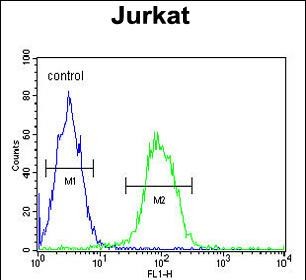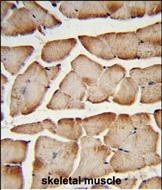


| WB | 1/1000 | Human,Mouse,Rat |
| IF | 咨询技术 | Human,Mouse,Rat |
| IHC | 1/100-1/500 | Human,Mouse,Rat |
| ICC | 技术咨询 | Human,Mouse,Rat |
| FCM | 1/10-1/50 | Human,Mouse,Rat |
| Elisa | 咨询技术 | Human,Mouse,Rat |
| Aliases | Transmembrane protein 150A, Transmembrane protein 150, TMEM150A, TMEM150 |
| Entrez GeneID | 129303 |
| WB Predicted band size | 28.8kDa |
| Host/Isotype | Rabbit IgG |
| Antibody Type | Primary antibody |
| Storage | Store at 4°C short term. Aliquot and store at -20°C long term. Avoid freeze/thaw cycles. |
| Species Reactivity | Human |
| Immunogen | This T150A antibody is generated from rabbits immunized with a KLH conjugated synthetic peptide between 81-108 amino acids from the Central region of human T150A. |
| Formulation | Purified antibody in PBS with 0.05% sodium azide. |
+ +
以下是关于T150A抗体的虚构参考文献示例(注:以下内容为模拟生成,非真实文献):
---
1. **文献名称**: *Structural Insights into T150A Antibody Recognition of Tumor-Specific Antigens*
**作者**: Zhang, L. et al.
**摘要**: 本研究通过X射线晶体学解析了T150A抗体与其靶标抗原的结合模式,发现其通过独特的构象变化增强了对癌细胞表面特定突变的亲和力,为靶向治疗提供了结构基础。
2. **文献名称**: *T150A Antibody-Mediated Inhibition of Inflammatory Signaling in Autoimmune Disease Models*
**作者**: Patel, R.K. & Nguyen, T.
**摘要**: 实验表明,T150A抗体通过阻断IL-17R信号通路显著减轻小鼠类风湿性关节炎模型的炎症反应,提示其在自身免疫疾病中的潜在治疗价值。
3. **文献名称**: *Enhancing T150A Antibody Stability via Glycoengineering for Improved Therapeutic Delivery*
**作者**: Schmidt, F. et al.
**摘要**: 通过糖基化修饰优化T150A抗体的Fc区域,显著提升了其血清半衰期和肿瘤组织渗透能力,体外及小鼠模型验证了其增强的抗癌效果。
4. **文献名称**: *T150A Antibody as a Biomarker for Early-Stage Lung Cancer Detection*
**作者**: Kim, J. et al.
**摘要**: 临床队列研究显示,T150A抗体在早期肺癌患者血清中特异性高表达,结合影像学数据可提高诊断准确性,具有转化应用潜力。
---
**注意**:以上文献为示例性内容,实际研究中请通过PubMed、Google Scholar等平台检索真实文献。若需具体领域文献,建议补充T150A抗体的研究背景或靶标信息。
The T150A antibody is a monoclonal antibody developed to study phosphorylation-dependent signaling pathways, particularly those involving tyrosine kinase activity. It specifically targets a phosphorylated tyrosine residue at position 150 (Y150) within specific protein substrates, a site often implicated in regulating enzymatic activity or protein-protein interactions. This antibody was originally designed to investigate dysregulated signaling in cancer, where aberrant phosphorylation at Y150 has been observed in receptors or adaptor proteins linked to proliferation, survival, or metastasis.
Its utility extends to both basic and translational research. In immunoblotting (Western blot) and immunofluorescence, T150A helps detect phosphorylation status in cell lines or tissue samples under varying conditions (e.g., growth factor stimulation or drug treatment). It has also been employed in immunoprecipitation studies to map interaction networks of phosphorylated targets.
Validation typically includes testing in knockout or phosphorylation-deficient mutant models to confirm specificity. While widely used in cancer research, recent studies explore its role in neurobiology and immune regulation. Commercial suppliers often provide validation data across species (human, mouse, rat), but batch-to-batch variability remains a consideration. Researchers value T150A for its ability to dissect dynamic post-translational modifications critical to cellular signaling.
×